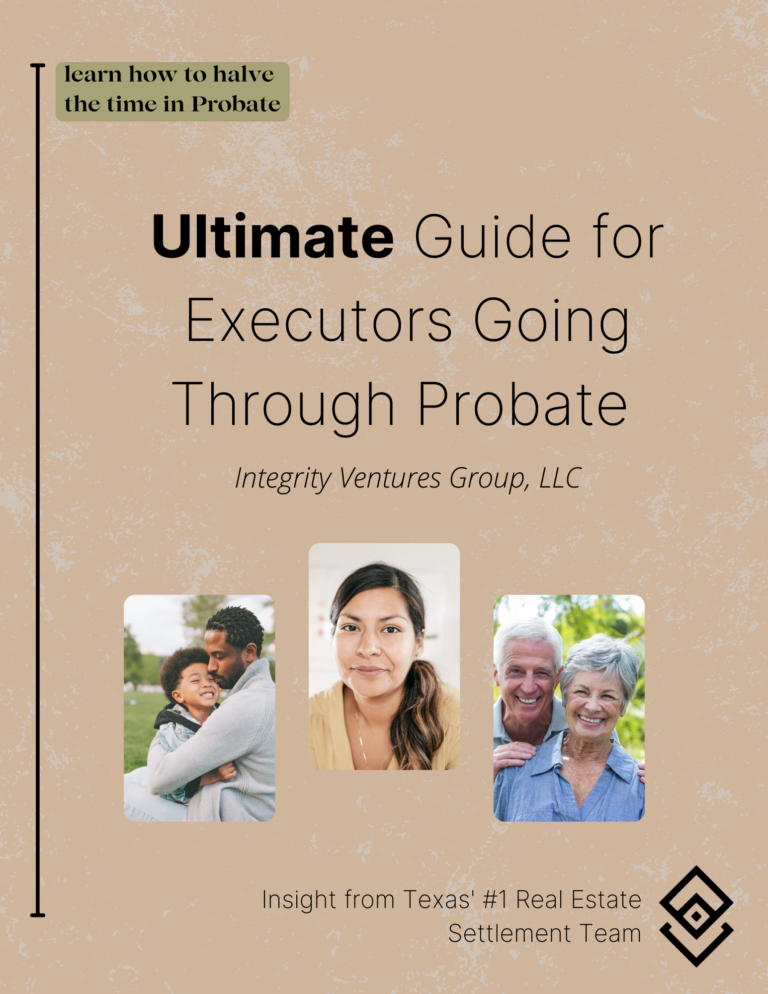do you want to cut your probate Process time in half?
Probate Disputes and Contests in Texas: How to Navigate the Legal Process
disclaimer
Integrity Ventures Group asserts that it is not a licensed lawyer, and this article is intended solely for providing general guidance and information, and should not be considered as legal advice or a substitute for consulting with a qualified attorney. For any specific legal grievances related to personal probate cases, we strongly advise individuals to seek professional legal counsel and engage the services of a licensed attorney.
At Integrity Ventures Group, we pride ourselves on being the premier estate settlement firm in Texas. Our expertise lies in assisting families daily, helping them unravel the complexities of their probate proceedings alongside their attorneys. We would be honored to extend our knowledge to help guide you through your unique journey as well. Let’s Dive into: probate disputes and contests in Texas.
Introduction
Losing a loved one is emotionally taxing, and the complexities of probate can further complicate an already challenging time. Unfortunately, probate disputes and contests are not uncommon, often arising from misunderstandings, unclear wills, or family disagreements. This guide aims to walk you through probate disputes and contests in Texas, providing a comprehensive overview of how to navigate this complex legal process.
What is Probate in Texas?
Probate is the court-supervised process of administering a deceased individual’s estate. In Texas, this involves validating the will, if there is one, settling debts, and distributing assets according to either the terms of the will or Texas state law in the absence of a will. Though the state’s probate process is relatively more straightforward compared to other states, the potential for disputes still exists.
Types of Probate Disputes and Contests in Texas
Will Contests
This occurs when someone questions the validity of the deceased’s will. Grounds for contesting a will include:
- Lack of Capacity: The deceased was not mentally capable of making a will.
- Undue Influence: Someone exerted inappropriate pressure on the deceased while making the will.
- Fraud or Forgery: The will is not genuine, or signatures have been faked.
Estate Mismanagement Claims
Here, a beneficiary or interested party claims that the executor is mishandling estate assets, either through incompetence or fraud.
Beneficiary Disputes
These are conflicts between beneficiaries over asset distribution, often when the will is unclear or open to interpretation.
Creditor Claims
Sometimes, the deceased’s creditors might assert that they have not been properly paid from the estate, causing disputes.

Steps to Take When Faced with Probate Disputes in Texas
Step 1: Consult an Attorney
The very first step in handling any probate dispute is to consult an experienced probate litigation attorney familiar with Texas law. They can guide you through the intricacies of Texas probate court and offer tailored advice for your specific situation.
Step 2: Gather Evidence
Collect all pertinent documents, including the will, estate inventory, correspondence, and any evidence that could be used to support your case.
Step 3: Notify Interested Parties
Texas law requires that all interested parties be notified of a probate dispute. This often includes beneficiaries, executors, and sometimes creditors.
Step 4: Mediation or Negotiation
Before heading to court, parties may attempt to resolve the dispute through mediation or direct negotiation. Many Texas probate courts encourage or even mandate mediation before a trial.
Step 5: Filing a Lawsuit
If no agreement is reached, you’ll need to file a lawsuit to resolve the dispute formally. Your attorney will guide you through this, which will include filing the appropriate petitions and motions in a Texas probate court.
Step 6: Trial
If the dispute reaches this stage, both sides will present their case in court, and the judge will issue a ruling.
Step 7: Appeal
If the court’s decision is not in your favor, you might have the option to appeal, though this can be both time-consuming and costly.
Potential Pitfalls and How to Avoid Them
Emotional Decision-Making: Probate disputes often involve family, and emotions can run high. While it’s natural to be emotionally invested, try to approach the dispute objectively and legally.
Lack of Documentation: In probate disputes, proper documentation can make or break a case. Always keep organized, comprehensive records.
Misunderstanding of Texas Law: Probate law varies by state. What applies in one state may not apply in Texas. Ensure you’re aware of Texas-specific rules and procedures.
Skipping Mediation: Often, disputes can be resolved without going to court, which saves both time and money. Do not overlook mediation as a viable option.
Costs Involved
Probate disputes can be expensive, involving court costs, attorney’s fees, and perhaps even expert witness fees. Parties should be aware that a prolonged dispute could significantly deplete the estate’s resources, leaving fewer assets for distribution.
Tips for Minimizing Disputes
Clear Will Drafting: Ambiguity in a will is a leading cause of probate disputes. Consulting with an experienced estate planning attorney when drafting a will can reduce this risk.
Frequent Updates: Life changes like marriage, divorce, or births can have implications on your estate plans. Regularly updating your will minimizes disputes.
Open Communication: Discussing your estate plans with your family can prepare them for what to expect, reducing the chances of disagreements later on.
Final Thoughts
Navigating probate disputes and contests in Texas is not only legally challenging but emotionally draining. A clear understanding of Texas probate law, coupled with the guidance of skilled professionals, can make the process more manageable. While this guide offers a comprehensive overview, every probate dispute is unique, and legal advice tailored to your specific circumstances is invaluable.
Disclaimer: This blog post is intended for informational purposes and should not be seen as legal advice. For personalized counsel, please consult a qualified attorney.
FIND MORE HELPFUL ARTICLES LIKE THIS ONE
DOWNLOAD YOUR PROBATE CHECKLIST TODAY.
Become a part of the numerous executors who have already benefited from our free guide. Elevate your probate process with our complimentary probate checklist, designed to guide you step by step through the process of selling your real estate property today. Download it now and streamline your journey through probate.






